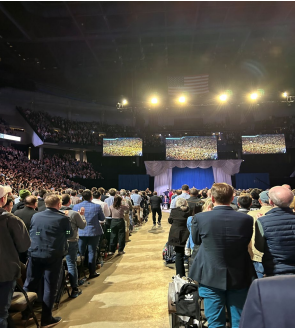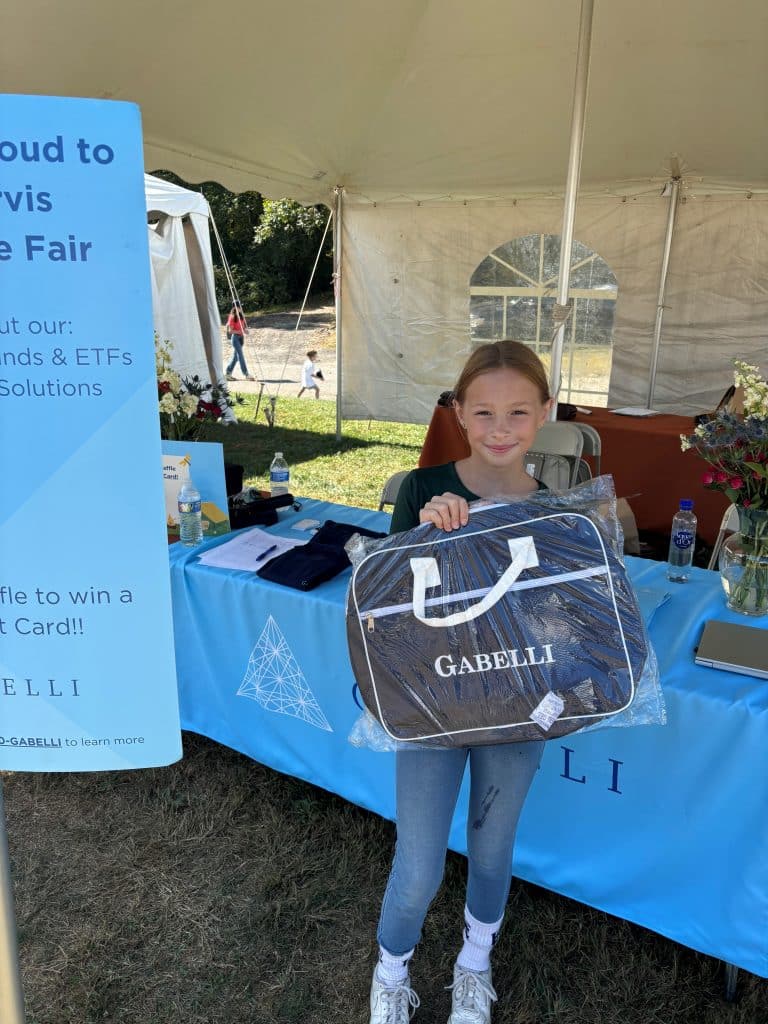Berkshire Hathaway: Reflections from the 2024 Annual Meeting
By Macrae Sykes
Berkshire Hathway: Reflections from the 2024 Annual Meeting

COMPANY OVERVIEW
Berkshire Hathaway Inc., based in Omaha, NE is a holding company for a diverse group of operating subsidiaries including insurance, freight rail transportation, utilities and energy, finance, services and retailing. The subsidiaries operate in an autonomous fashion, while investment and capital allocation decisions are managed by Warren Buffett (93) and a team of managers including Todd Combs (53) and Ted Weschler (61). As of December 31, 2023, since 1965, the firm had an annual compounded gain of 19.8%.
On May 4, Berkshire Hathaway held its annual meeting. Warren Buffett hosted with support on stage from Vice Chairmen, Greg Abel and Ajit Jain following the passing of long-time corporate partner, Charlie Munger. Q&A alternated between Becky Quick from CNBC (emailed questions) and questions from the audience. We estimated that the CHI Health Center was completely full at its ~18,000 capacity and a total of 30,000+ in the city of Omaha. Warren opened the meeting with some comments on the 1Q24 results, which highlighted $11.2 billion of operating earnings and a record accumulation of ~$190 billion of cash and equivalents. The session also featured a movie dedication to Charlie Munger starting from his early years working at the Buffett store to clips from former annual meetings and finally some highlights from Charlie’s funny interactions on a number of past annual meeting satires. Additionally, Ruth Gottesman (widow of long-time Berkshire Hathaway Board member Sandy Gottesman) was honored for her $1 billion donation to The Albert Einstein College of Medicine, which will go towards providing free tuition in perpetuity and a bi-product of a successful investment in Berkshire Hathaway. Lastly, long-time friend, Carol Loomis (94), was recognized in the crowd for her tenure as Warren’s editor for the annual report. She formerly “retired” at age 85 from Fortune but has remained a consistent confidante to the Chairman around some of the most important communication from the conglomerate.
Takeaways:
- Management succession remained a focus of questions with little incremental insight on the well-known plans. Greg Abel will be in charge of operating company capital allocation and is a great choice based on his business acumen. The firm is in great shape for the next 20+ years given the current bench and tenure among the managers. It is possible that the Board could be faced with some unexpected interruptions in management continuity and therefore should not rule out more potential interaction, but shareholders should feel positive that turnover should remain low, with little need for attracting more material numbers of senior leaders. No one that expects to retire at 65 is probably going to be a good fit for the conglomerate team.
- In 1Q, cash and equivalents rose to ~$190 billion, and is likely to be $200 billion at the end of 2Q. The firm is generating about $100 million per day in operating earnings, which needs to be allocated. Still, there remains no pressure to go outside the traditional Berkshire discipline. “We only swing at pitches we like. Things are not attractive. There are certain ways things can change. We will have to see what happens.” Warren also noted that investment income will rise this year comparatively in the insurance segment due to the combination of higher cash balances and reinvestment at higher interest rates, both of which will help drive operating earnings in 2024+.
- The firm sold ~115 million shares of Apple (AAPL: NASDAQ) during the quarter or approximately 13% of total. That leaves the firm with 790 million shares marked at a current value of $145 billion. They still believe the tech company will stay one of the largest core holdings, but left the door open to sell down more of the position. One reason for the reduction in ownership was a worry that corporate tax rates (21% currently and down from 35% a few years ago) will likely rise in the future, which would reduce after-tax proceeds (capital gains impact) from future sales. We would note realized capital gains in the quarter were $11.2 billion, a reflection of the significant gains from the Apple investment.
- On the contrary, Berkshire sold out its remaining shares of Paramount Global (PARAA: NASDAQ) for a loss. Last quarter, the firm reduced the position by 30 million leaving 63 million shares ahead of a potential deal for the media company. Warren Buffett stated he was responsible for the investment.
- There were several questions about the utility businesses. Greg and Warren noted the large opportunity ahead for the utility sector given future power demand by the movement to electric vehicles and technology innovation cycle from AI that is supported by investment in data centers. In Nevada, power demand could triple from the current base by 2030, while Utah could see a doubling in the next few years. As per recent litigation around wildfires, Greg is disappointed by the escalation in claims that well exceed economic recoveries. Last week, the press reported an incremental $30 billion in claims from an existing class action. The firm expects to vigorously defend the cases and has already accounted for $2.4 billion in cumulative losses from the events. Berkshire management believes they are one of the right partners for addressing the future power consumption needs due to scale of capital, core competency in planning projects, and working successfully with communities. However, they will not pursue investment in regions that don’t protect rational private/public partnership economics, in contrast to the challenges occurring in Oregon today. “We are not interested in losing money for shareholders.” –WB
- International Investment. The firm expects to continue a concentration of capital allocation to the United States given competitive economic dynamics and the sheer size of the market for investing. They started investing in Japan in 2019, which has been a nice opportunity, but has been a little challenging in terms of the velocity of putting more significant capital to work (~8% ownership in five different “Japanese trading companies”). There were separate questions about other global regions of investment opportunity. They like Canada given its likeness to growth in the US and are pursuing a potential opportunity currently. India was admired as being a place with potential, but unlikely to see Berkshire interest given Warren’s lack of local cultural understanding. He qualified that by saying it was not a negative about India, which probably had lots of opportunity. It was just that he personally felt more comfortable with the US.
- AI. Like last year, there was a question about the expected impact on Berkshire’s businesses. Warren made a comparison to the US developing nuclear weapons, which had unintended consequences. AI is potentially a similar step-up in technology innovation but remains to be seen what major negative consequences there could be. He recently opened up an AI generated Warren Buffett equivalent communication that looked and sounded just like him but was not. This sparked fears of the potential for scams in the future. In reaction to the communication, “I practically tried to send money to myself.”
- Insurance. A number of important items were offered in feedback. First, the insurance business remains Berkshire’s crown jewel and even more important than executing well on equities investing because of the risk involved. Ajit Jain has been a unique force of return and risk mitigation. In 1Q, the firm generated strong underwriting results, partially as function of a significant increase in Florida contracts against a docile quarter for catastrophe losses (of all categories the firm is most exposed to Atlantic hurricanes). Second, Ajit Jain is confident in the management succession plans for him referring to a strong bench of established operators that have worked well in the Berkshire system of insurance operations. As good as Ajit Jain is, the business will remain formidable due to its competitive advantages of scale and legacy cultural expertise that Ajit has built during his long tenure of starting and growing the insurance segment. Digging in, they see opportunities in more challenged markets like Florida with regulations evolving to better protect economics. Cyber security is a fast growing and exciting market for underwriting in the industry, but not desirable for Berkshire as the actuarial data set is limited for understanding true risk. Berkshire is only embracing this market when necessary, inclusions for policies and treating all underwriting as a certain potential loss. Warren quoted Charlie Munger on the distaste for this industry underwriting – “it could be rat poison.” GEICO’s performance has been below target as of late as the firm hopes to catch-up to industry leader Progressive (PGR: NYSE), which made the competitive leap by investing more in analytics and managing better premium/risk dynamics. Ajit is confident in the progress and notes GEICO’s competitive costs of funds as an underappreciated aspect.
- Following the landmark Missouri real estate court case, Warren instructed Greg Abel to deal with the fall-out related to Berkshire real estate subsidiary, HomeServices. The unit recently settled for $250 million, $140 million after-tax with liability being borne below the parent level. As a result of the case, brokerage commission practices are likely to be altered. Long-term, corporate still has confidence in the business (continue to believe agent advice is best for major transactions) and expects to grow inorganically through future consolidation in the fragmented industry. Warren noted he has sold two houses in his lifetime, the last one for $7 million and did not ask for a discount on agent fees.
PERFORMANCE
Berkshire Hathaway continues to be among the largest public capitalizations in the United States. Since taking over Berkshire Hathaway in 1965, Mr. Buffett has generated an overall gain of 4,384,748% vs. the 31,223% change in the S&P 500 (including dividends). We would note that Berkshire’s performance is after-tax, while the S&P 500 return is pre-tax.

VALUATION
In the past, Mr. Buffett referred to Berkshire’s change in book value as one proxy for evaluating the progress against the S&P 500 Index. Since 2004, price-to-book (GAAP) value has fluctuated between 1.1x and 2.0x. At the end of March 2024, book value per Class A Share was $397,627 or about 1.5x the current price (~1.4x YE ’24 P/B).

REPURCHASE LEVELS
For many years, Berkshire had a common share repurchase plan based on buying shares at prices no higher than a 20% premium to book value. On July 17, 2018, Berkshire’s Board of Directors changed the program. Now Warren Buffett (and previously with Charlie Munger) is authorized to repurchase shares when he believes shares are trading at a discount to intrinsic value, “conservatively determined.” Since the change, the company has repurchased 64,105 Class A Shares for $26.4 billion and 216 million Class B Shares for $51.3 billion. (Table 2) The average repurchase price per “A” and “B” was $411,111 and $237.11, respectively, compared to the current May 3 closes of $601,830 and $399.24.












